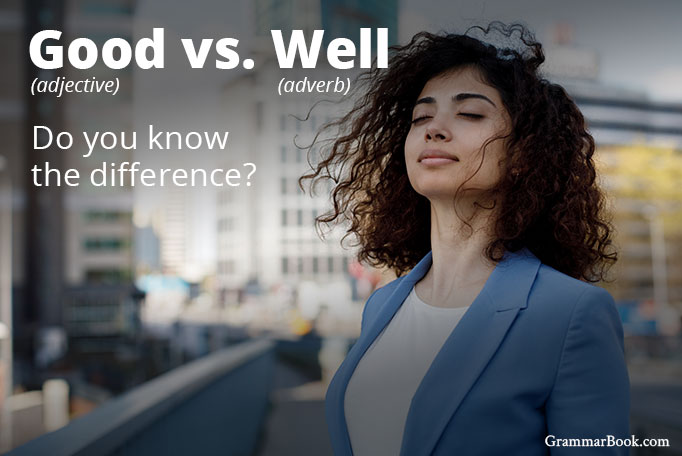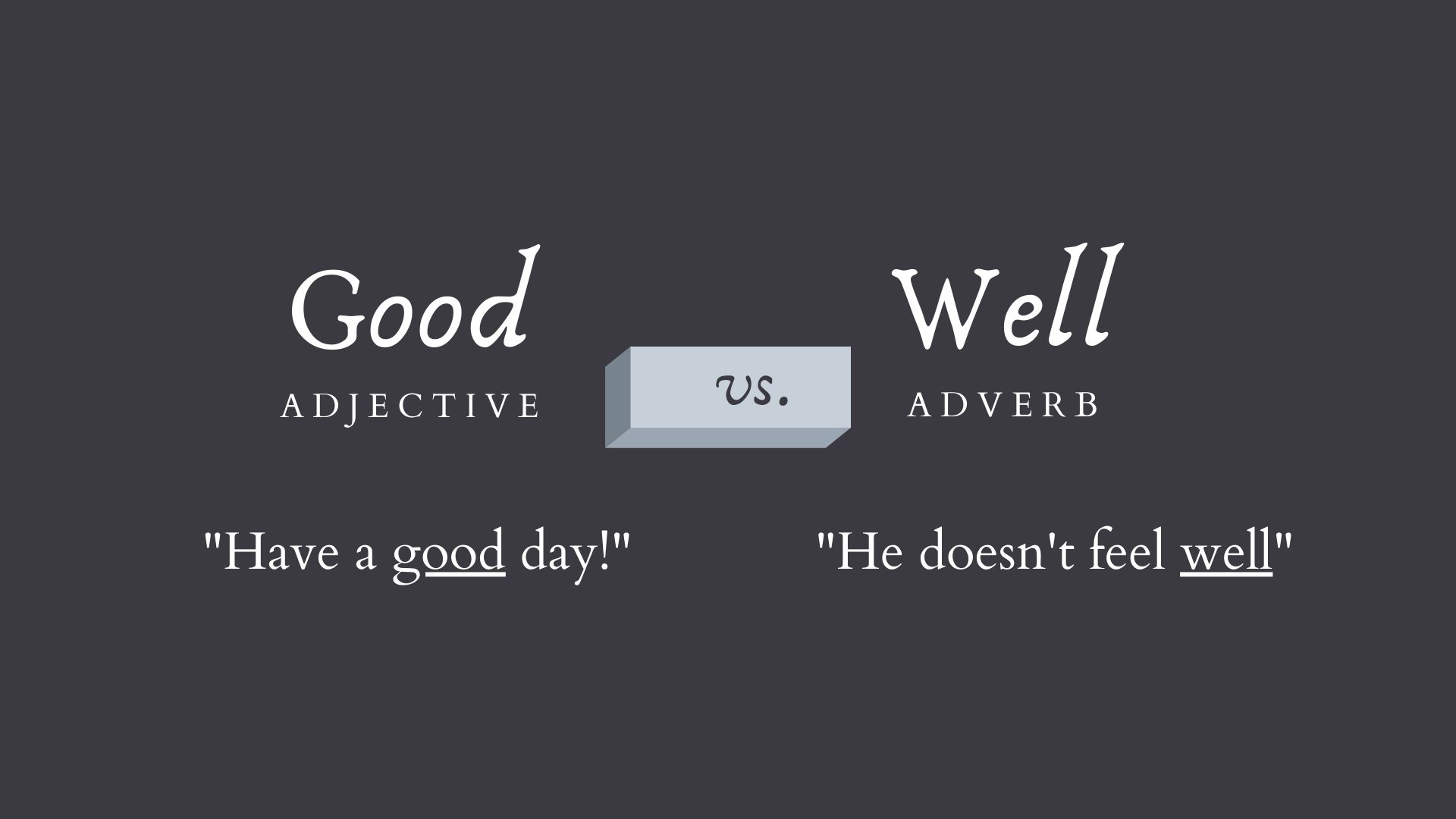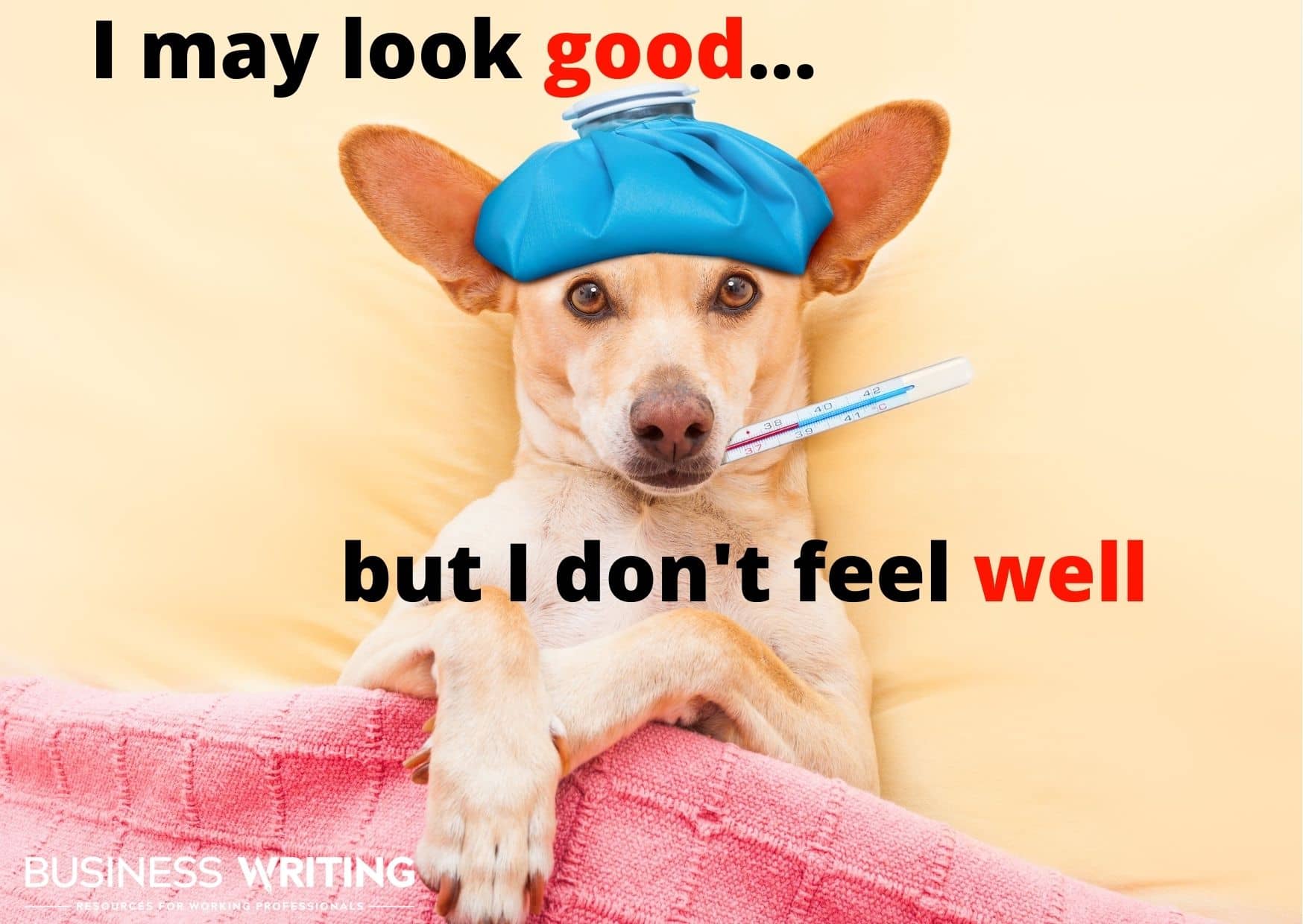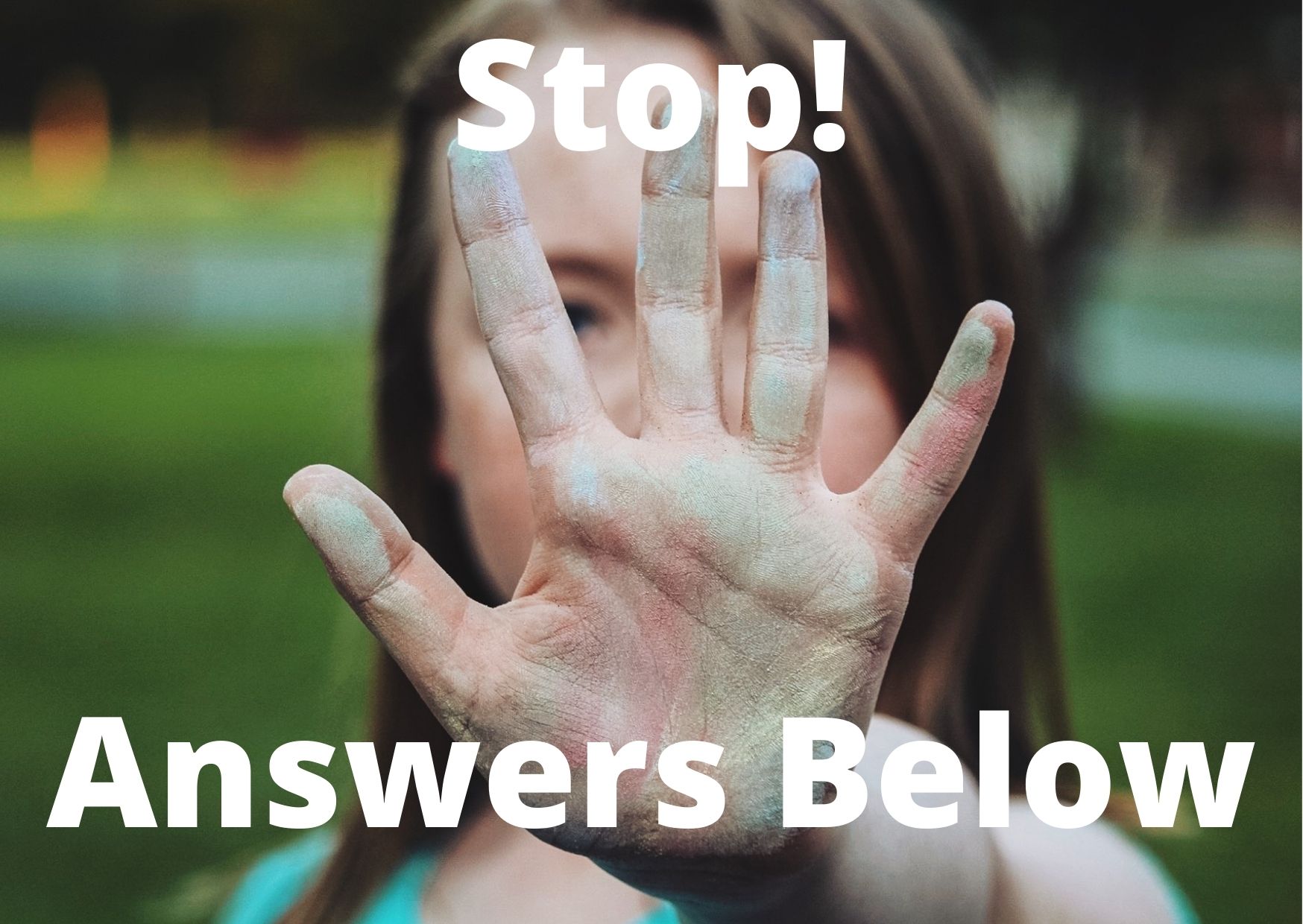January 27, 2023
The words “good” and “well” are some of the most frequently misused words in the English language, so if you can’t tell the difference between the two, you’re not alone. Ensure you can correctly answer the question “how are you doing?” before it comes up next. Are you feeling good or are you feeling well? Did you play good or did you play well? By the end of this article, you’ll have the right answers to these questions.

Even though the words “good” and “well” have similar positive meanings, they cannot be used interchangeably. If you want to write like a pro, it’s essential that you master when to use the words “good” and “well.”
When to use the word “well”
The word “well” is an adverb, so it is used to modify verbs—in many cases, you’ll see “well” directly after a verb. As a reminder, a verb is an action.
Polish your grammar with Microsoft Editor
Test your writing with Editor’s free grammar checker.
Learn More
However, the word “well” is used as an adjective when discussing health.
Using well correctly in a sentence
Here are some examples of the word “well” being used correctly in a sentence:
- I did well on the test.
In the sentence above, “well” modifies the verb “did.”
- The team works well under pressure.
In the example above, “well” modifies the verb “works.”
- I didn’t sleep very well last night.
In the example above, “well” modifies the verb “slept.”
- The team played well in the final quarter.
In the example above, the verb “played” is modified by the adverb “well.”
When to use the word “good”
The word “good,” for our purposes, is an adjective that modifies a noun. As a reminder, a noun refers to a person, place, or thing.
The word “good” may also sometimes be used with linking verbs. Linking verbs are verbs that don’t necessarily express an action but instead connect the sentence’s subject with an adjective or noun. “Good” is used with linking verbs such as “looks,” “sounds,” “seems,” and “smells”—so be on the lookout for these! The linking verb “feel” can also be used with “good” in a sentence, but only if it refers to emotions or one’s state of mind.
Using “good” correctly in a sentence
Here are some examples of the adjective “good” being used correctly in a sentence:
- If you do a good job, you’ll get a promotion.
In the above example, the word “job” is a noun, and “good” modifies that noun.
- The pasta they made last night was so good!
In this example, “good” modifies the noun “pasta.”
- The new Thai restaurant that opened looks good.
In this case, “good” is used since “looks” is a linking verb.
- The perfume my husband bought me smells good.
Again, “good” is used in this case because of the linking verb “smells.”
- Sarah is finally starting to feel good after the breakup.
In the instance above, the verb “feel” refers to Sarah’s emotions, so “good” is used here instead of “well.”
How to remember the difference between “good” and “well”
Here are some tips to help you remember when to use “good” and when to use “well” in a sentence:
- “Well” is generally used with verbs or actions.
- “Good” is generally used with nouns.
- When speaking or writing about someone’s health, use the word “well.” For example: He said he wasn’t feeling well, so he went to the nurse’s office.
- When speaking or writing about an event or action, use the word “well.” For example: The bachelorette party went well.
- When speaking or writing about feelings, use the word “good.” For example: She is feeling good about the new job.
- When speaking or writing about an idea, thing, person, or place, use the word “good.” For example: All the students had a good time on the field trip.
Tips to improve your grammar
If you’re still feeling stuck on when to use “good” versus “well,” consider using a writing assistant like Microsoft Editor. Writing assistants like Editor can be downloaded for free as an extension to your browser and will notify you of any spelling or grammar issues across email, social media, documents, and more. Spelling assistants are an extremely valuable tool and are essential if you want to improve your writing.
Now that you understand when to use good and when to use well, you can write effectively and with confidence. If you want to continue honing in on your writing skills, check out these writing essentials.
Get started with Microsoft 365
It’s the Office you know, plus the tools to help you work better together, so you can get more done—anytime, anywhere.
Buy Now
Topics in this article
Tags
More articles like this one
When to use ‘choose’ vs ‘chose’
The verb “choose” means to pick out or select something from multiple options. The key to knowing when to write the word “choose” vs. “chose” is understanding the tense in which you’re writing.
Learn more
What is a prepositional phrase?
Prepositional phrases are a key part of the English language. Find out how to improve your grammar by understanding how a prepositional phrase fits into your writing projects.
Learn more
What does “rhetorical” mean?
Rhetoric is language used to persuade others. Explore exactly what “rhetorical” means and how to use rhetorical questions.
Learn more
What are collective nouns?
Collective nouns are used to refer to a group of people, animals, or things. Improve your grammar and writing by learning more about collective nouns.
Learn more

Everything you need to achieve more in less time
Get powerful productivity and security apps with Microsoft 365
Buy Now
Last Update: Jan 03, 2023
This is a question our experts keep getting from time to time. Now, we have got the complete detailed explanation and answer for everyone, who is interested!
Asked by: Glenda Johns
Score: 4.6/5
(43 votes)
All you need to remember when you are pondering whether good or well is best for your sentence is that good modifies a person, place, or thing, whereas well modifies an action. If you’re having a good day, then your day is going well.
Do you say I am well or I am good?
Therefore, «I’m good,» is a proper response. «I’m well» is also allowed but not for the reasons many think. That response only works if «well» takes on its adjectival form, meaning «in good health» or «good or satisfactory.» Now, if someone asks «How are you doing?» «I’m doing well» is the correct response.
Do you do good on a test or well?
Many people, including many native speakers, incorrectly use the adjective form good, rather than the adverb well. Examples: I did good on the test. … Use the adjective form good when describing something or someone.
Are good and well interchangeable?
Though many people think ‘well’ and ‘good’ are synonyms, or words that have the same meaning, they are not interchangeable. Instead, they often function as different parts of speech, like adjectives, adverbs, and nouns. … ‘ As ‘good’ is not an adverb, it can’t modify the verb ‘doing.
How do you use the word well?
We use well as an adverb when something is done to a good standard or in a good way:
- He drives very well.
- I work very well late at night.
- This table isn’t very well-made.
- I like my steak well-cooked. (I like my steak cooked for a long time.)
38 related questions found
What does well before mean?
(to do something) well before (someone else): (to do something) a long time previous to, much before, earlier than (someone else) adverb.
Is saying well rude?
9 Answers. «Well» does not serve any grammatical usage in this sentence. That’s because, in this context, «well» is an interjection, a word that expresses emotion. Depending on how it is enunciated, «well» could indicate impatience, surprise, nervousness, and a variety of other emotions.
Did you sleep well or good?
Most people say «sleep well.» The simple explanation goes like this: «Good» is an adjective (modifying a noun, like «good coffee»). «Well» is an adverb (modifying a verb or verb phrase, like «play the guitar well»).
What is the difference between Wel and well?
We’ll is the contraction of We will. Well is the adverb of Good. My sister can sing well. ‘Well’ describes the way she sings so is an adverb.
How do you use the word quickly in a sentence?
Quickly sentence example
- The storm passed quickly , but the night remained warm. …
- I quickly accessed my options. …
- I got up, and dressed quickly and ran downstairs. …
- The world is quickly moving to participatory government. …
- My wife quickly recovered and smiled.
When should you use the word everyone instead of everyone?
Everyone (one word) should be used when referring to all the people within a group. A good way to remember this is to note that the pronoun everyone may be replaced by everybody. See the examples below: The new protocols will affect everyone positively.
What is but in grammar?
The word but is one of the seven coordinating conjunctions in English (the others are and, or, so, for, nor, and yet). It’s used to connect two statements that contrast or contradict each other in some way.
Is so good grammatically correct?
Examples: You did a good job. Good describes job, which is a noun, so good is an adjective. You did the job well.
What is correct I feel good or I feel well?
Both answers are correct. Feel well and be well refer to one’s health. Well in this case is an adjective. This is the only use of well as an adjective-to mean healthy, not sick. Feel good means to feel happy.
What should I reply for I am fine?
You can answer this in many ways. If you’re feeling good, you can say: «Good,» «Pretty good.» or «Not bad..» Even though these answers mean the same thing as «I’m fine,» you can’t answer «How’s it going?» with «I’m fine.» It will sound a bit strange.
How do you say I’m good too?
i am good too is the most popular phrase on the web.
…
i am fine too
- Once again, I am fine.
- Enough with the suicide watch. I am fine.
- But I found the hikers and I am fine.
- I appreciate your concern, but I am fine.
- Yes, I am fine now.
- After operation, I am fine.
- Two thugs jumped me, but I am fine.
What are the two meaning of well?
1 : to rise to the surface and usually flow forth tears welled from her eyes. 2 : to rise like a flood of liquid longing welled up in his breast. transitive verb. : to emit in a copious free flow. well.
What does 12.0 mean?
12 is a slang term for police or any law enforcement officials. It came from the police radio code “10-12” and the 1968 TV show Adam-12, which followed two police officers Pete Malloy and Jim Reed, from the Los Angeles Police Department (LAPD) patrolling the Los Angeles streets in their patrol car, 1-Adam-12.
What is the word class of well?
What type of word is well? As detailed above, ‘well’ can be an adverb, an adjective, an interjection, a noun or a verb. Adverb usage: He does his job well. Adverb usage: A well done steak.
Can you say sleep good?
The difference is that sleep good is considered incorrect, even though people might use it sometimes – only sleep well should be used in correct English.. Examples: – Good night, sleep well. – Good night, have a good sleep.
Did you sleep well reply?
There’s really no magic to this answer, Nasridine. You could say «Oh, I slept on and off» or «Not bad» or «It was okay».
How do you tell someone they are rude in a nice way?
Be super polite! Sometimes being extra polite and super sweet can really highlight someone else’s rudeness. Demonstrating your own kindness can really make their rudeness stand out like a sore thumb. By the way, stick out or stand out like a sore thumb is a great idiom to say something is really noticeable or obvious.
What are rude comments?
My definition of rude comments is those responses that doesn’t fit into normal society. They can be irrelevant, inappropriate, detrimental or just downright annoying. They are not written with a kindly disposition, but usually in contempt, with an aim to cause havoc or upset.
What can I say instead of well?
well
- acceptably,
- adequately,
- all right,
- alright,
- creditably,
- decently,
- fine,
- good,
“Good” and “well” are two commonly used words in the English language, but they are often misused and confused with each other.
However, using the wrong term can make you sound silly or even unprofessional. This is why it’s time to clear up the good/well confusion and get people to take you seriously.
Whether you are a native English speaker or a non-native speaker learning the language, understanding the proper use of “good” and “well” is essential for effective communication.
“Good” and “well”—What they mean and how to use them
📌
“Good” is an adjective used to describe a person, thing, or situation that’s desirable, positive, or beneficial. It’s often used to express approval or satisfaction with something.
She has a very good teacher.
He used to be a good friend of mine, but now we barely say hi to each other.
In the examples above, the adjective “good” describes the nouns “teacher” and “friend.” The point is that “good” almost always precedes and describes a noun.
📌
When it comes to “well,” it’s an adverb that can be used in a few ways. Its primary meaning is to describe how something is done or performed. When used this way, it usually indicates that something was done satisfactorily or effectively.
Being an adverb means that it modifies a verb which is the word denoting an action in the sentence.
Even though we played well, we still lost the game.
Unfortunately, the project didn’t go well.
In the examples above, “well” modifies the verbs “play” and “go.” The key thing to remember here is that “well” almost always modifies an action or verb.
Good vs. Well
So what’s the difference between “good” and “well”? Although both words have similar meanings, they are different parts of speech. So if you need an adjective to describe something or someone, the chances are you need the word “good.”
And if you need an adverb to modify an action or verb, you probably need “well.” But like any other rule, this one also has an expectation.
Exceptions you need to be aware of
Although the word “well” is commonly used as an adverb, sometimes it’s used as an adjective. This happens when we describe or talk about someone’s health and usually with the verbs “look,” “feel,” and “be.”
How’s your father? He’s not well.
Is your sister well now? I know she had a car accident last Saturday.
Another exception is when we use linking verbs. In most cases, sensory verbs like taste, feel, sound, smell, and appear. Despite being verbs, they don’t go with the adverb “well” but with the adjective “good.”
This pretzel tastes so good.
I can tell you’re cooking because it smells so good.
Last but not least, we use “good” instead of “well” when referring to one’s emotional state.
I feel good about myself.
She didn’t feel good when her mom scolded her in front of everyone.
Are you sure you got the difference between “good” and “well”?
Answer these 6 questions and see the results!
I’m an ESL teacher with over 7 years of experience in providing original content. I really like writing educational articles which may help others learn some aspects of English.
Good is an adjective while well is an adverb answering the question how. Sometimes well also functions as an adjective pertaining to health.
Examples:
You did a good job.
Good describes job, which is a noun, so good is an adjective.
You did the job well.
Well is an adverb describing how the job was performed.
I feel well.
Well is an adjective describing I.
Good vs. Well Rules
Rule: With the four senses—look, smell, taste, feel—discern if these words are being used actively to decide whether to follow them with good or well. (Hear is always used actively.)
Examples:
You smell good today.
Good describes you, not how you sniff with your nose.You smell well for someone with a cold.
You are sniffing actively with your nose here so use the adverb.She looks good for a 75-year-old grandmother.
She is not looking actively with eyes so use the adjective.
Rule: When referring to health, always use well.
Examples:
I do not feel well today.
You do not look well.
Rule: When describing someone’s emotional state, use good.
Example: He doesn’t feel good about having cheated.
So, how should you answer the question, “How are you?” If you think someone is asking about your physical well-being, answer, “I feel well,” or “I don’t feel well.” If someone is asking about your emotional state, answer, “I feel good,” or “I don’t feel good.”
Please see our post How Are You—Good, Well, or Fine?, which provides more discussion and helpful examples.
Pop Quiz
1. She jogged very good/well for her age.
2. She had a good/well time yesterday.
3. With a high fever, it is unlikely he will feel good/well enough to play basketball tomorrow.
4. Those glasses look good/well on you.
Pop Quiz Answers
1. She jogged very well for her age.
2. She had a good time yesterday.
3. With a high fever, it is unlikely he will feel well enough to play basketball tomorrow.
4. Those glasses look good on you.
Are you ready for the quiz?
Good vs. Well Quiz
Advertisement
If the article or the existing discussions do not address a thought or question you have on the subject, please use the «Comment» box at the bottom of this page.
Updated 28, November 2021: Good vs. Well: as small and simple as they might seem, these two words can confuse writers. Knowing which word to use in a sentence often poses a challenge.
Remembering Parts of Speech
The key thing to know is that good is an adjective while well is an adverb. That means that you should use good to modify a noun, whereas well modifies a verb. So:
- A person, place, thing, or idea might be
- An action might go
When you write a sentence and must decide whether to use good or well, determine if you are modifying a noun or a verb.
Related: What is a conjunctive verb?
When to Use Well
Here are some samples for modifying verbs:
Incorrect: We did good in the trivia contest.
Correct: We did well in the trivia contest.
Incorrect: I feel like that even went good.
Correct: I feel like that even went well.
In these examples, we are modifying verbs: did and went. As such, we need to use well as the modifier.
Related: Learn about modifiers.
When to Use Good
Here are some examples for modifying nouns:
Incorrect: Have a well day!
Correct: Have a good day!
In the examples above, we are modifying day, which is a noun. Consequently, we use the adjective good to modify it.
The Nonaction Exception
There are some exceptions to the adjective/adverb rule. One involves nonaction verbs. These include:
- To be
- To feel
- To look
- To seem
You can use the adjective modifier good. For example:
Example: I hope your vacation is good.
Example: This essay seems good.
The Health Exception
To complicate things, there is an exception to the nonaction verb exception. It involves health or wellbeing. When describing a person’s health and using a nonaction verb, you would default to well instead of good.
Incorrect: Eleanor was sick last week, but now she is good.
Correct: Eleanor was sick last week, but now she is well.
The examples above show how inference plays a role in the correct work. The expression be good implies behavior. Be well means physical and emotional wellbeing.
Sensory Verbs Exception
Finally, if you use a linking verb connected to one of the five senses, you would use the adjective good. Sensory verbs point to further information about the subject, not an action involving an object. They include:
- To appear
- To feel
- To look
- To seem
- To smell
- To sound
- To taste
Here are several examples of the correct use of good with a sensory verb:
Example: The fresh-baked banana bread smelled good.
Example: The orchestra sounds good tonight.
Linking Verb Exception
Linking verbs connect nouns to modifiers. The most recognizable linking verbs have to do with the senses: look, smell, sound, taste, etc. Concerning good and well, linking verbs function the same as non-action verbs. You use good with them.
Example: The pot roast smells good.
Example: The concerto sounds good.
Example: The chocolate sundae tastes good.
Example: The new curtains look good.
—
Test Yourself
Here is a little quiz to test your newfound knowledge:
1. He ran very good/well for his age.
2. The family had a good/well time last week.
3. Still recovering form a cold, it is unlikely she will feel good/well enough to play softball tomorrow.
4. This suite look good/well on you.
5. The new sofa looks good/well.
6. My wife’s cooking always smells good/well.
7. The siblings did quite good/well on the test.
Quiz answers:
1. He ran very well for his age.
2. The family had a good time last week.
3. Still recovering form a cold, it is unlikely she will feel well enough to play softball tomorrow.
4. This suite look good on you.
5. The new sofa looks good.
6. My wife’s cooking always smells good.
7. The siblings did quite well on the test.
Want to sharpen your business writing skills? Discover our acclaimed online courses.












